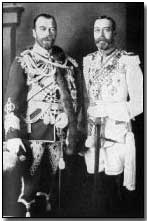Primary Documents - Tsar Nicholas II Takes Command of Russian Armies, 5 September 1915
 Reproduced below is the
text of
Tsar Nicholas II's official letter to
Grand Duke
Nikolai dated 5 September 1915. In his formal letter the
Tsar thanked Nikolai - his uncle - for serving as Russian Army
Commander-in-Chief; he announced however that he had now found time to take
day to day control of the Russian Army.
Reproduced below is the
text of
Tsar Nicholas II's official letter to
Grand Duke
Nikolai dated 5 September 1915. In his formal letter the
Tsar thanked Nikolai - his uncle - for serving as Russian Army
Commander-in-Chief; he announced however that he had now found time to take
day to day control of the Russian Army.
The Tsar's decision to assume command of the Russian Army was made in spite of virtually unanimous cabinet opposition; the latter correctly feared that any setbacks the Army suffered would necessarily reflect directly upon the Tsar himself.
Tsar Nicholas II to Grand Duke Nikolai
5 September 1915
At the beginning of the war I was unavoidably prevented from following the inclination of my soul to put myself at the head of the army. That was why I entrusted you with the Commandership-in-Chief of all the land and sea forces.
Under the eyes of the whole of Russia your Imperial Highness has given proof during the war of steadfast bravery which caused a feeling of profound confidence, and called forth the sincere good wishes of all who followed your operations through the inevitable vicissitudes of fortune of war.
My duty to my country, which has been entrusted to me by God, impels me to-day, when the enemy has penetrated into the interior of the Empire, to take the supreme command of the active forces and to share with my army the fatigues of war, and to safeguard with it Russian soil from the attempts of the enemy.
The ways of Providence are inscrutable, but my duty and my desire determine me in my resolution for the good of the State.
The invasion of the enemy on the Western front necessitates the greatest possible concentration of the civil and military authorities, as well as the unification of the command in the field, and has turned our attention from the southern front.
At this moment I recognize the necessity of your assistance and counsels on our southern front, and I appoint you Viceroy of the Caucasus and Commander-in-Chief of the valiant Caucasian Army.
I express to your Imperial Highness my profound gratitude and that of the country for your labours during the war.
Source: Source Records of the Great War, Vol. III, ed. Charles F. Horne, National Alumni 1923
Shrapnel comprised steel balls ejected from shells upon detonation.
- Did you know?
